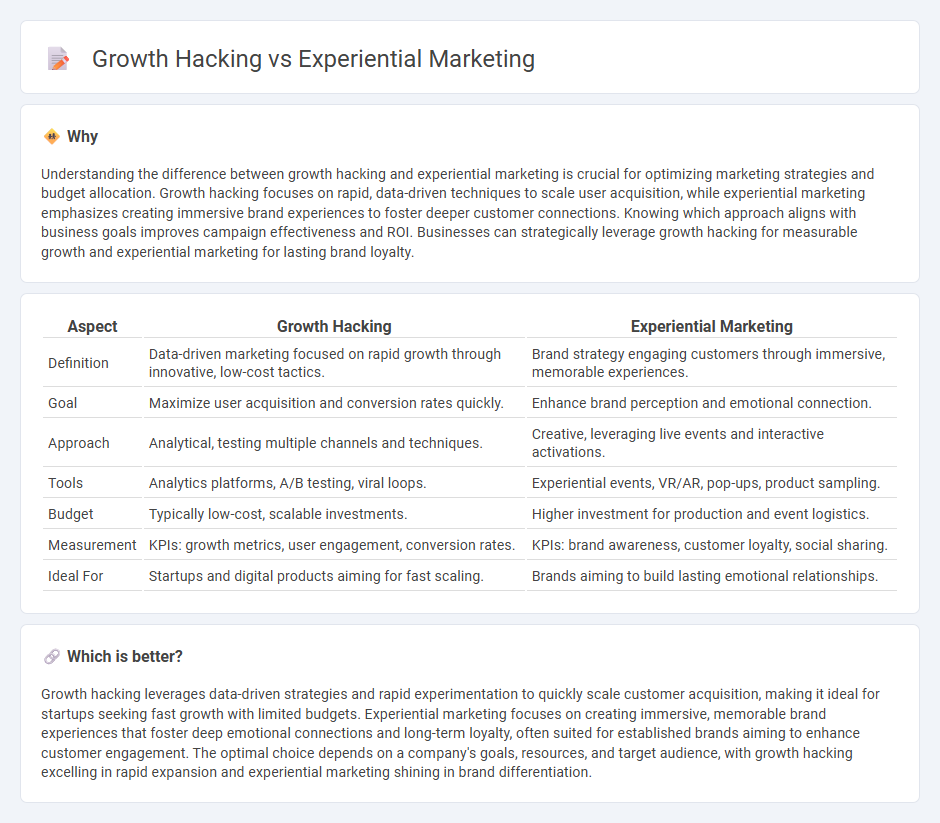
Growth hacking focuses on rapid experimentation across marketing channels to identify the most effective ways to grow a business quickly, often leveraging data-driven techniques and creative digital strategies. Experiential marketing, in contrast, creates immersive and memorable brand experiences that foster deeper emotional connections and customer engagement through live events and interactive campaigns. Discover how these innovative marketing approaches can transform your brand strategy by exploring their key differences and applications.
Why it is important
Understanding the difference between growth hacking and experiential marketing is crucial for optimizing marketing strategies and budget allocation. Growth hacking focuses on rapid, data-driven techniques to scale user acquisition, while experiential marketing emphasizes creating immersive brand experiences to foster deeper customer connections. Knowing which approach aligns with business goals improves campaign effectiveness and ROI. Businesses can strategically leverage growth hacking for measurable growth and experiential marketing for lasting brand loyalty.
Comparison Table
| Aspect | Growth Hacking | Experiential Marketing |
|---|---|---|
| Definition | Data-driven marketing focused on rapid growth through innovative, low-cost tactics. | Brand strategy engaging customers through immersive, memorable experiences. |
| Goal | Maximize user acquisition and conversion rates quickly. | Enhance brand perception and emotional connection. |
| Approach | Analytical, testing multiple channels and techniques. | Creative, leveraging live events and interactive activations. |
| Tools | Analytics platforms, A/B testing, viral loops. | Experiential events, VR/AR, pop-ups, product sampling. |
| Budget | Typically low-cost, scalable investments. | Higher investment for production and event logistics. |
| Measurement | KPIs: growth metrics, user engagement, conversion rates. | KPIs: brand awareness, customer loyalty, social sharing. |
| Ideal For | Startups and digital products aiming for fast scaling. | Brands aiming to build lasting emotional relationships. |
Which is better?
Growth hacking leverages data-driven strategies and rapid experimentation to quickly scale customer acquisition, making it ideal for startups seeking fast growth with limited budgets. Experiential marketing focuses on creating immersive, memorable brand experiences that foster deep emotional connections and long-term loyalty, often suited for established brands aiming to enhance customer engagement. The optimal choice depends on a company's goals, resources, and target audience, with growth hacking excelling in rapid expansion and experiential marketing shining in brand differentiation.
Connection
Growth hacking leverages creative, data-driven strategies to rapidly increase customer acquisition and engagement, while experiential marketing creates immersive brand experiences that deepen emotional connections with audiences. Both approaches emphasize innovation and customer-centric tactics to drive viral growth and foster brand loyalty. By integrating growth hacking's analytical mindset with experiential marketing's focus on memorable interactions, companies can amplify reach and conversion rates effectively.
Key Terms
**Experiential Marketing:**
Experiential marketing creates immersive brand experiences that engage consumers emotionally and physically, driving deeper connections and long-term loyalty. Techniques often include live events, interactive installations, and sensory activations designed to create memorable interactions that traditional ads can't match. Explore how experiential marketing transforms customer engagement and boosts brand perception.
Brand Activation
Experiential marketing centers on creating immersive brand activations that deeply engage consumers through interactive events and sensory experiences. Growth hacking emphasizes rapid experimentation across marketing channels to identify the most effective ways to grow a brand's customer base efficiently. Explore more to understand how brand activation strategies can bridge experiential marketing and growth hacking for maximum impact.
Immersive Events
Experiential marketing leverages immersive events to create memorable, engaging brand experiences that foster deep customer connections and loyalty. Growth hacking emphasizes rapid experimentation and data-driven strategies to optimize user acquisition and retention, often employing immersive events as a catalyst for viral marketing and customer engagement. Discover how integrating immersive events in your growth strategy can amplify both brand experience and accelerated growth.
Source and External Links
What Is Experiential Marketing? - Limelight Platform - Experiential marketing is a strategy engaging consumers through live, immersive experiences that transform passive audiences into active participants to build emotional connections with brands via events, demos, or pop-ups.
Engagement marketing - Wikipedia - Experiential marketing creates custom memorable experiences that engage customers emotionally, aiming to deliver sensory, emotional, cognitive, and rational value and differentiate brands by fostering loyalty through meaningful interactions.
What is experiential marketing? Definition and examples - Amazon Advertising - Experiential marketing connects brands with consumers via in-person or digital hybrid experiences like pop-up stores and virtual events, focusing on memorable engagement, brand representation, and measurable impact through direct interactions.
 dowidth.com
dowidth.com